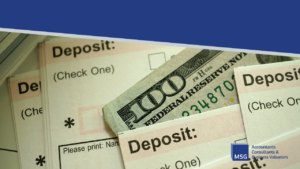Discussing hidden cash and unreported income is always a popular topic for both commercial litigators and family law attorneys. Currently, we are working on several engagements that have developed into full-fledged forensic accounting and fraud investigations.
Experts (as well as IRS investigators) look at key areas to prove that cash is missing and to estimate how much income the business owner may not be reporting. Hidden cash can be discovered by taking a closer look at:
- Bank deposits: These can be used to reconstruct income by analyzing the parties’ bank deposits, canceled checks, and currency transactions, accounting for cash payments made from undeposited currency receipts and non-income cash sources, such as loans, gifts, inheritances, or insurance proceeds.
- Sources and use of funds: Here, the business owner’s personal sources and uses of cash are analyzed to determine where the owner’s income and other funds came from and how they were eventually used. If the owner is spending more money than they are taking in, the excess may represent unreported income.
- Net worth: An unsubstantiated increase in a business owner’s net worth can reveal unreported income. Telltale documents such as bank and brokerage statements, real estate records, and loan or credit card applications are often used to define this increase. The net worth gain is calculated, reported income is subtracted, and the amount is further adjusted to reflect any nondeductible expenditures and non-income sources of funds.
- Percentage markup: Net income is often estimated by applying a benchmark profit percentage to sales or some other base amount. In most cases, percentage markup is used as a reasonableness check to corroborate the results of other approaches. Industry benchmarks and comparable companies can provide valuable insights into the expected profitability of the business, helping to identify any anomalies in the reported income.
Contrary to popular belief, forensic accountants don’t automatically assume that every closely held business owner is hiding cash. While some businesses may be more susceptible than others, further due diligence is often required when red flags appear.
Although forensic accountants are chartered to quantify potential hidden cash and unreported income, they rely on the legal expertise of attorneys to ensure they obtain the right information.
For additional information on this or any other business valuation, forensic accounting, or litigation support issue, please schedule a consultation with our office here.


